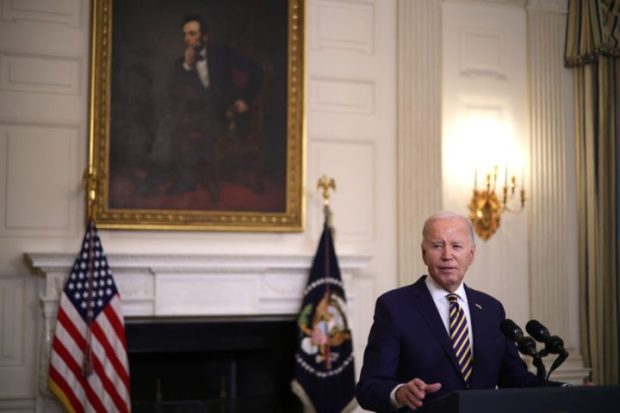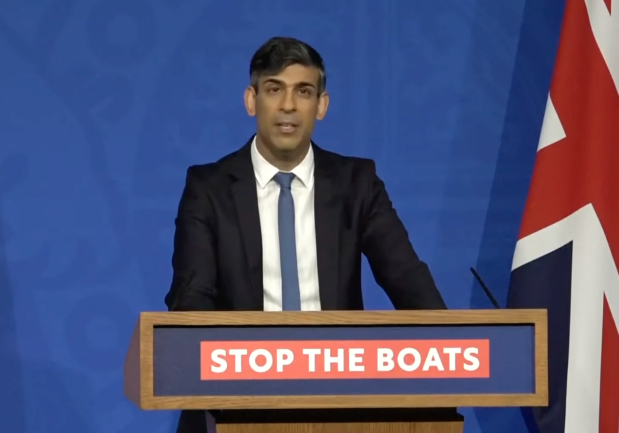Is Covid over? With Plan B restrictions finally lifted, there’ll be no more working from home. Masks will no longer be required in shops. Covid passes will become a thing of the past. We can go back to normal permanently. Or can we?
Things won’t be the same as they were in 2019, but they will be close. We will live in a world where occasional booster jabs – and careful monitoring of those arriving in our country – are the only noticeable things separating life before and after the pandemic. This normality is available to us, if we want it. The problem is, I’m not totally certain everyone does.
Lockdowns, masks, social distancing and limits on meetings were never intended to be an endpoint. They were a way of managing the pandemic until something better came along. Thanks to Britain’s successful vaccination campaign, it has. Nine in ten Brits over the age of 12 have had one jab; 84 per cent have had two; 64 per cent have had a booster. Every eligible person who wants a vaccine has been offered one. Everyday life no longer involves exposing other people to significant risk.
When lockdowns were first imposed, the justification for collective restrictions wasn’t that people were incapable of judging their own risk. The measures were justified on the basis that, without them, people might not adequately consider the impact on those vulnerable to the virus. These restrictions – that would be intolerable under almost any other circumstance – were explicitly recognised as an intrusion of the state into the everyday lives and interactions of the population. It’s vital that this is remembered as we step tentatively back into the ‘new normal’.
It’s true that there are some people who have not yet been jabbed. But that is no reason to justify continued measures. These people were offered a vaccine and will continue to be offered one. For wrong or right, they have made their own minds up. Society cannot be restructured to preserve their wellbeing.
How about the fact that some people are immunosuppressed or will succumb to breakthrough infections? That they still face risk is an unfortunate reality of the situation we find ourselves in. But again, it does not justify sweeping interventions. We do not make policy to minimise deaths; if we did, we would lock the population in a series of sterile cubes away from any danger or interest, much as we did during lockdown. Instead, we make policy to improve wellbeing. And the cost to our collective wellbeing of insisting on ever more elaborate Covid-theatre now vastly exceeds the benefits to the small number who are involuntarily at risk, not least because its maintenance encourages some deeply strange tendencies in society.
I’m sure I’m not the only one who feels slightly uncomfortable at exhortations to ‘protect the NHS’. This is a phrase which reverses the proper relationship between a population and its healthcare system. I also feel uneasy when a person is praised for sharing their emotional reaction to discovering a loved one popped into a shop unmasked, or posting long and rambling messages about how they’re still terrified of Covid.
Part of the problem is that Westerners lack a religious framework with which to make sense of life. Without this, it can be hard to think clearly about illness and death. It’s hardly surprising that a pandemic – that makes the certainty of dying central to everyday life – will, for some, produce an excessive fear. People rubbing their hands raw with sanitiser, taping masks to their face for brief walks in the park, and insisting that the state return to enforcing total social atomisation should be sympathised with. But it doesn’t mean we have to listen to them, just as we should not have to listen to anti-vaxxers lecturing us on the evils of Pfizer.
But while Britain is by no means free from these tendencies, we should at least be grateful that we’ve avoided the worst excesses of the Covid discourse. A brief glance at those across the Atlantic who alternatively credit the virus to a conspiracy cooked up by Dr Fauci, the chief medical advisor to the president, or compose what they fondly imagine to be Disney-esque TikTok songs in his honour, should make us grateful.
We should also feel relieved that Covid has, by and large, not become a party political issue in this country. After all, the one thing you absolutely cannot do in a pandemic is make its handling a partisan thing. Why? Because tribalism will switch off the parts of your brain you desperately need to make good decisions. Those with long memories may recall the great Covid-reversal of 2020, when Republicans – ‘China virus! Bioweapon!’ – and Democrats – ‘prejudice is the real virus, it’s less deadly than the flu’ – went in for their half-time break and came out having swapped sides. They may also recollect the brief and interesting period when the virus was a deadly threat to anyone outdoors except those peacefully protesting the death of George Floyd by lighting urban bonfires. And how about the nascent Democratic anti-vax movement that would under no circumstances take a medicine rushed through by Donald Trump?
When an issue becomes entrenched along party lines, no-one is led by evidence or science. Everyone ends up making decisions based on politics or tribe. A cultish worship of experts is not a good substitute for rationality either; the experts told us to avoid wearing masks, before flipping absolutely without shame or recognition of the fact.
So, as we emerge from life under Plan B, let’s remember that we owe our return to normality thanks to a high vaccine uptake and the ability to rapidly roll out boosters. The ability to fall back on collective action to control future variant outbreaks is also vital. Back to normal for everyone? We can only hope. That’s quite enough of pestilence for now. Time for one of the other horsemen to have a turn. See you in the Donbas.
Got something to add? Join the discussion and comment below.
Get 10 issues for just $10
Subscribe to The Spectator Australia today for the next 10 magazine issues, plus full online access, for just $10.


















Comments
Don't miss out
Join the conversation with other Spectator Australia readers. Subscribe to leave a comment.
SUBSCRIBEAlready a subscriber? Log in